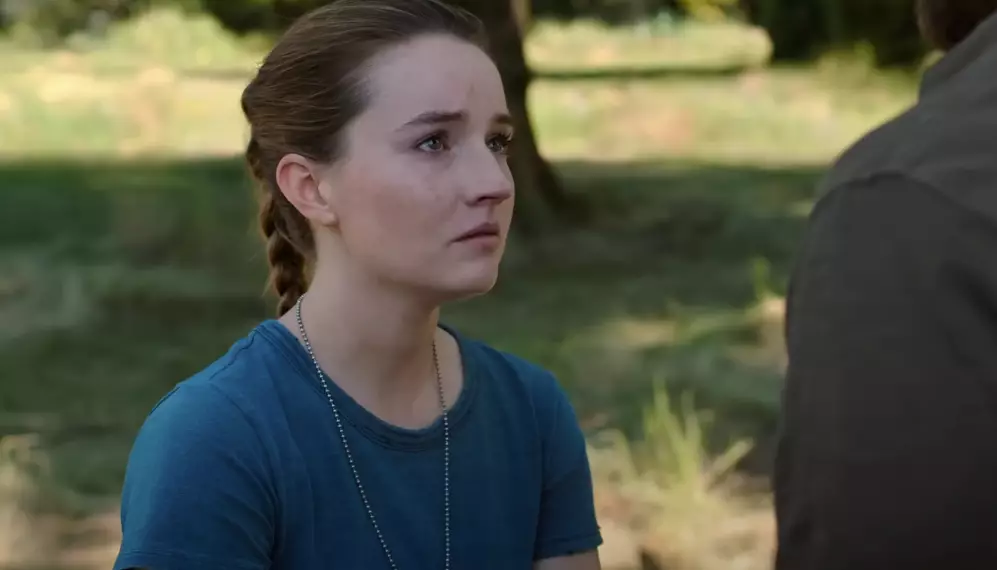In the opening moments of “The Last of Us” Season 2, Episode 1, viewers are thrust into the depths of vengeance through a chilling monologue delivered by Kaitlyn Dever’s character, Abby. This moment captures the essence of Abby’s character—laden with sorrow and desperation as she hunts for Joel (Pedro Pascal), driven by a singular motive: to avenge her father’s death. Dever’s portrayal of Abby as an “ice queen” is not only apt but also serves as a haunting reflection of the emotional turmoil that underpins her craving for retribution. This isn’t a quest for mere revenge; it’s an unsettling journey filled with brokenness and a need for resolution in a world stripped of hope.
Dever emphasizes the chilling nature of Abby’s ambition, stating, “She just needs something to make it all better.” However, the audience quickly recognizes the futility of her desires; her obsession is a double-edged sword, ultimately leaving her more fragmented. This duality within Abby generates profound discourse, as fans grapple with the moral implications of her choices, mirroring the complex narratives introduced in “The Last of Us: Part II.”
Striking a Balance Amidst Controversy
As conversations surrounding Abby’s character swirl within the fan community, Dever’s commitment to her role stands out. Despite being aware of the mixed reception Abby received in the gaming world, she chooses to prioritize her performance over public opinion. “If I was too worried about what was being said about this character online… I think it would have taken away from the performance,” she admits. This statement underlines the necessity for actors to immerse themselves fully in their characters without being encumbered by external biases.
The creative vision behind “The Last of Us” lies in the hands of Craig Mazin and Neil Druckmann, who approached the adaptation with fierce resolve, seemingly unperturbed by past controversies. Their confidence in Dever’s ability to bring Abby to life fosters an environment ripe for dynamic storytelling. Dever’s insights into their collaborative process reveal a deeper understanding of character arcs in a narrative densely woven with themes of loss, vengeance, and moral ambiguity.
A Casting Choice Unlike Any Other
Interestingly, Dever’s journey to embody Abby did not involve the conventional audition process. Initially considered for the role of Ellie—an opportunity that didn’t materialize—Dever’s eventual casting as Abby was instead a product of her established rapport with the show’s creators. “They’re very confident storytellers,” she remarks about Mazin and Druckmann, highlighting their remarkable ability to identify the right talent for complex roles.
This unique casting decision showcases an innovative approach to character development in adaptations, suggesting that established relationships can lead to a more authentic portrayal. Such decisions resonate with audiences, cementing the belief that the series possesses an intricate understanding of its characters that transcends initial impressions.
Record-Breaking Debut: A Foreshadowing of Impact
“The Last of Us” Season 2 premiered to resounding success, amassing 5.3 million same-day viewers— a notable increase from its first season debut. This statistic not only reflects the show’s growing popularity but also emphasizes the anticipation surrounding Abby’s character arc. Viewers are captivated by the promise of deep emotional exploration and the complex interplay of relationships in a post-apocalyptic world.
As the season unfolds, the consequences of Abby’s thirst for vengeance will likely ripple throughout the narrative, inviting fans to grapple with their sentiments surrounding her motivations. The larger theme of human suffering in both “The Last of Us” game and television adaptations challenges traditional notions of heroism and villainy, setting the stage for intense, thought-provoking dialogue around empathy, trauma, and consequence.
Understanding Abby’s character becomes more than just following her quest for revenge; it encapsulates an exploration of human emotion in a world devoid of clear answers. The narrative’s push and pull between character and audience sentiment exemplifies the elegance of storytelling, encouraging us to ponder the darker corners of our motivations and relationships in times of despair.

